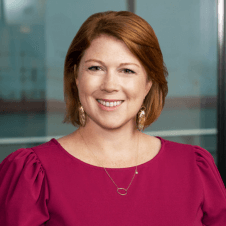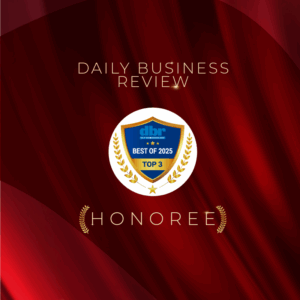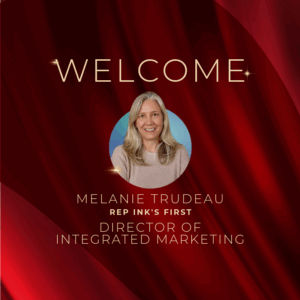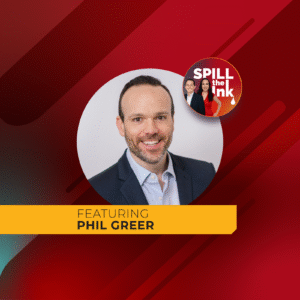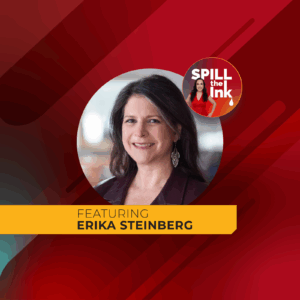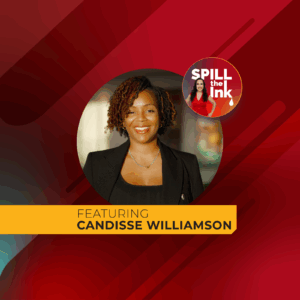
Spill the Ink: The Reputation Ink Podcast
The Legal Marketer’s Blind Spot: Start Treating Lawyers as Clients
You can’t sell a product effectively without understanding it. In law firms, that product is the attorneys. To sell legal services, legal marketers need to invest in not just learning the firm’s clients and industries, but also the nuances of the attorneys they support and the economics that drive their daily decisions.
In this episode of “Spill the Ink,” Powers Tanis, Senior Director of Strategic Initiatives at McAngus Goudelock & Courie and 2025 Legal Marketing Association Southeast Region President, joins us to discuss how grasping attorney pain points, billing pressures and case lifecycles enables marketers to do their jobs better, build stronger relationships and manage expectations effectively. Powers and Michelle Calcote King also explore how to navigate the “say yes to everything” culture by reframing requests instead of rejecting them, and why creating psychological safety for calculated risks is essential in risk-averse legal environments.
Here’s a glimpse of what you’ll learn
- Why treating attorneys as internal clients transforms marketing relationships and leads to better collaboration and realistic expectations.
- How understanding law firm economics and billing pressures gives marketers the context needed to make strategic decisions.
- The mentorship strategy that unlocks insider knowledge about the business of law from financial services teams and practice group leaders.
- How to transition from “yes person” to strategic partner by aligning marketing initiatives with firm-wide goals and objectives.
- The framework for balancing urgent requests with high-impact projects while navigating law firm partnership hierarchy and management dynamics.
- Why creating a “fail forward” culture drives innovation even in the traditionally risk-averse legal environment.
- The scheduling and prioritization practices that separate strategic legal marketers from those who remain stuck in reactive, task-oriented roles.
About our featured guest
With two decades of experience in branding, strategy and project management, Powers Tanis leads the marketing, client engagement and employee engagement and experience teams at McAngus Goudelock & Courie (MGC), a nationally-recognized insurance law firm with 22 offices across 12 states. As the Senior Director of Strategic Initiatives, Powers plays a pivotal role in shaping and executing the firm’s long-term strategic vision. This includes spearheading and managing high-impact projects, developing and managing long-term strategic plans for the firm and its practices and partnering with the management committee on organizational goals and objectives. Powers is also responsible for developing and executing strategic marketing initiatives that enhance the firm’s brand, expand the client base and drive business growth, as well as implementing strategies to foster a positive and inclusive organizational culture.
As a strategic communications professional, Powers aims to help organizations tell their stories through branding, digital and traditional media, and organizational culture. Powers has expertise in branding, marketing strategies, event planning, and fundraising, with specialties in social media strategy, graphic design, event planning, brand roll-out, and strategic communications.
Powers is dedicated to defining, building and maintaining an organization’s culture, understanding that a well-defined culture is crucial for the success of both the organization and its clients. At MGC, Powers is heavily involved in building and maintaining the firm’s culture through internal employee engagement efforts, community impact, diversity, equity and inclusion initiatives, and leadership development programs.
Since 2012, Powers has been actively involved in the Legal Marketing Association, transitioning to the legal sector after nearly a decade in the nonprofit sector. Powers currently serves as President-Elect for the LMA Southeast (LMASE) Regional Board of Directors, and is the past co-chair for the 2022 LMASE Regional Conference and LMA’s Regional Conference Task Force. Powers has also served on the Local Steering Committee (LSC), most recently as the LSC Chair for the Columbia group. Additionally, Powers has dedicated over 15 years to the Junior League of Columbia, serving on both the Board of Directors and the Executive Management Team in various roles.
Resources mentioned in this episode
- Check out McAngus Goudelock & Courie
- Follow McAngus Goudelock & Courie on LinkedIn
- Learn more about the Legal Marketing Association
- Connect with Powers Tanis on LinkedIn
- Say hello to Michelle Calcote King on LinkedIn
Sponsor for this episode
This episode is brought to you by Reputation Ink.
Founded by Michelle Calcote King, Reputation Ink is a marketing and public relations agency that serves B2B professional services firms of all shapes and sizes across the United States, including corporate law firms and architecture, engineering and construction (AEC) firms.
Reputation Ink understands how sophisticated corporate buyers find and select professional services firms. For more than a decade, they have helped firms grow through thought leadership-fueled strategies, including public relations, content marketing, video marketing, social media, podcasting, marketing strategy services, creative services and more. To learn more, visit www.rep-ink.com or email them at [email protected] today.
Transcript
Disclaimer: What you’re reading is an AI-transcribed version of our podcast. It may contain mistakes, including spelling and grammar errors.
[00:00:00] Powers Tanis: By showing them that we want to partner with the lawyers. We want to understand what it means to bill an hour, what it means to bill time, to have write-downs and write-offs, to do these kinds of things. Understand a caseload and the enormous work and grind that they’re under every day.
It shows them that they need to mirror that behavior with their clients.
[00:00:28] Announcer: Welcome to Spill the Ink, a podcast by Reputation Ink, where we feature experts in growth and brand visibility for law firms and architecture engineering and construction firms. Now, let’s get started with the show.
[00:00:45] Michelle Calcote King: Hi everyone. I’m Michelle Calcote King. I’m your host, and I’m the principal and president of Reputation Ink. We’re a public relations and thought leadership marketing agency for B2B professional services firms, including architecture, engineering, and construction firms. To learn more, go to www.rep-ink.com.
We often talk about the importance of attorneys understanding their clients’ industries, but what about the marketers supporting those attorneys?
Our guest today says legal marketers make a critical mistake when they focus solely on understanding firm clients while overlooking the business needs and perspectives of the individual attorneys they work with. I’d like to welcome Powers Tanis to today’s episode. Powers is the senior director of strategic initiatives at McAngus Goudelock & Courie.
She plays a pivotal role in shaping and executing the firm’s long-term strategic vision, and she’s also the 2025 president of the Legal Marketing Association Southeast Region. I’m honored to serve on that board under her leadership. Thank you and welcome to the show.
[00:01:51] Powers Tanis: Thank you for having me. I appreciate it.
[00:01:54] Michelle Calcote King: I am really excited to talk about this with you. I thoroughly enjoy serving on the board with you, so it’s fun to be able to have this conversation. Tell me — I gave a short, brief intro about you, but I’d love to hear more about your story, about yourself and your firm, how you got into legal marketing and what you currently do at your firm.
[00:02:17] Powers Tanis: I have been at MGC — McAngus Goudelock & Courie is a mouthful, so call it MGC — I’ve been here for nearly 13 years. I started as the communications director. We had a very small marketing team at the time, and I came from the nonprofit world, which is very different from the legal industry.
I jumped in thinking I’ll be here for a couple years and then I’m going to go straight back to nonprofit. Didn’t happen. I’m still here 13 years later. I’ve had a few different positions within the firm over that period of time, and now I serve as the senior director of strategic initiatives.
I have the privilege of leading our marketing, events, employee experience and learning and development teams at the firm, as well as really focusing and driving the strategic plan for the firm. MGC is an insurance services law firm. We have around 315 lawyers and we have 23 offices in 12 states.
We’ve grown tremendously since I started in 2012, and that’s not going to slow down anytime soon. So it is an exciting time. It has been an exciting ride, and it’ll keep going.
[00:03:40] Michelle Calcote King: Fantastic. I love to see a marketing professional elevated into a strategy role. That’s really exciting and honestly somewhat rare.
Let’s talk about — in the intro and in your conversations with our producer, we talked about how a lot of legal marketers really focus on those external audiences. But when you’re in this role, you really have an internal client base. Tell me what investing time to truly understand those — your internal clients, your attorneys’ work and perspectives — how does that lead to better marketing and more successful marketing outcomes?
[00:04:23] Powers Tanis: I think so often as marketers, we immediately focus on the company’s clients and how we sell a product to those clients. But as legal marketers, we really cannot sell a product to those clients until we really understand what that product is. It’s a lot harder than a normal product.
We’re selling intangible services, and to do that, we need to look at our clients. I tell my team this all the time: Our lawyers’ clients are not our clients. Our clients are our lawyers. We are here to help them with their marketing and business development efforts every single day. They’re the ones that are out in front of the clients, not us.
We need to really understand the lawyers’ challenges, their pain points, their opportunities. In doing so, we will learn about their clients, but it shows them that we are invested in what they do, what they struggle with, what keeps them up at night and how we can make an impact to make it easier.
Then they can also take those kinds of actions and that thought process and apply it to their clients as well. By showing them that we want to partner with the lawyers, we want to understand what it means to bill an hour, what it means to bill time, to have write-downs and write-offs, to do these kinds of things, understand a caseload and the enormous work and grind that they’re under every day.
It shows them that they need to mirror that behavior with their clients as well.
[00:05:57] Michelle Calcote King: You talked about pricing models, and I can imagine it’s other things like practice group structures and just those ins and outs. It’s funny you said you tell your team — I always tell my team, “Follow the dollar.” When we’re working with a new client, really understand how that firm makes money, what impacts that firm, because in the end, as marketers, that’s what we’re here to impact: growth, revenue, profitability, those kinds of things. How does that change the approach to marketing? What are some ways that you see that in your daily work?
[00:06:37] Powers Tanis: If we recognize and better understand, like you just said, how that dollar is made, how the money is made, I think it helps us not only speak the same language as our lawyers and be able to craft a better message and coach them better, but also to understand how they work, what they do and why they do it, to help them develop that message for their clients. We can help them better understand — because we’re not lawyers, we don’t understand legalese — but we can take what it is they do once we learn about it and translate it into a message and help market them better to their clients.
Really, it gives us that insight into how the money is made and how we can make sure that our lawyers are sharing that message the right way as to what they do to make that money — how they’re serving their clients, what their priorities are with their clients and how they understand their clients.
[00:07:42] Michelle Calcote King: Absolutely. You have to establish, I think, credibility with your client base, which is the internal attorneys. If you’re talking to them and giving them advice or tools that don’t suit their day-to-day work or just don’t make sense for how their workflow works or their relationships, you’re never going to have that credibility with them and you’re not going to be effective at all.
I remember butting my head once about attorneys not giving us email lists. I finally talked to an attorney about that and he said, “Well, I’m just so protective of my client relationships that I’ve built up over the years, and I’m so scared to just hand that to someone.” That changed my thought process around email in general, that this isn’t some anonymous audience you’re talking to. These are people that they have deep relationships with, that they’ve worked with over the years. So you have a precious asset that you have to protect.
It’s little things I think that you learn over the years that help you impact what you’re doing — those little insights. So if you’re new to legal marketing, you don’t have the ability to just learn these things slowly over time. Where would you start?
I just had a call with somebody the other day who’s been in business development for years and now she finds herself at a law firm and she’s like, “This is a whole new world.” Where do people start to really start understanding that?
[00:09:25] Powers Tanis: It is a whole new, strange world.
There are so many resources out there. I think you can start in your own firm — find a mentor or a champion or somebody who’s willing to talk to you about the business of law. Find a lawyer who can talk to you about how they do things, why they do things, who can tell you what the terms mean.
Find somebody in other administrative and business services departments. Find somebody on the practice management team who can really break down the process and the life of a file and what it means to have a matter — who knows what a matter is. These are terms we never knew coming from another industry.
Find somebody in the accounting or the financial services area to talk to you about how that dollar is made, what profitability is, the margins and that kind of thing. Don’t be afraid to ask questions. Find — just ask questions from anybody you can in your firm. Take them out for a cup of coffee, go sit in their office and just build that relationship and ask questions.
It goes a long way because like we tell our lawyers all the time, you need to get out there and better understand the inner workings of your clients’ business, their challenges, their pain points, why they do it, how they do it, what keeps them up at night. Having those conversations and just going and sitting and learning from these lawyers builds that same relationship on our end.
The other big thing that’s out there externally is the Legal Marketing Association, LMA. I’m going to put a plug in for it. It’s the best organization out there to really provide educational opportunities, networking opportunities, professional growth for legal marketers, whether you are a brand new marketing assistant coming in with a firm or a service provider, or you are a CMO.
We have so many resources, so many opportunities. The body of knowledge, webinars, in-person seminars and workshops and conferences — there’s just a plethora of resources with LMA. Finally, there are tons of blogs and websites and other resources out there. You just start Googling and you can find anything and everything.
[00:11:51] Michelle Calcote King: I agree. On that call that I was just on recently, I immediately — having been in the — and this isn’t a promo for the Legal Marketing Association, it is just a real life experience — but I said to her, “This association, you won’t find a group of people that are more willing to share knowledge and help out.” They have to be careful about confidentiality and any kind of proprietary strategies. But in general, they’re more than willing to help out with how the law works and just those kinds of ins and outs of things. There’s an entire group, special interest group for solo marketers at firms.
That was the first place I told her to go. I said, “You’re going to find other people with those same challenges.” The other thing I heard on a podcast recently — it was a thought leader named Jeff McKay and he called it — he said what marketers and professional services have to understand is that there’s always going to be the “BS of PS,” is what he called it, which is the BS of professional services that are just natural challenges that come about by the structure of firms. I thought that was — just naming it and putting that name on it and saying this exists, and it is a thing. Just acknowledge it, understand it so that you’re not banging your head against a wall. I loved that. I thought, “This is —” I’m sure the corporate world has its unique things, but professional services have their unique things.
The other thing I want to talk about is — you and my producer talked about this sort of knee-jerk reaction to saying yes to everything in law firms. As a strategist, I’m sure this is something you come up against. You’re overseeing strategy in a law firm, which is the art of narrowing things down to what exactly you’re going to do.
How do you balance wanting to be that service provider to your clients, who are the lawyers, to being strategic about what you take on? How have you balanced that in your career?
[00:14:07] Powers Tanis: It’s a hard one. Being in a law firm, you’re brought up to say yes to everything. A partner comes to you, you say yes, and “How high?” and “Which star would you like?”
If we say yes to everything that comes our way, are we ever moving the needle? Are we ever moving our firm forward? Are we ever getting closer to our goals? It really is a hard balance. I think there are a couple of best practices that I’ve put in place, both with me and with my team to not necessarily say yes to everything, but also not say no — maybe learn more.
Understand what the ask is and take that ask and say, “OK, it doesn’t really fit our strategy to get to X, Y, Z goal. It does fall into that bucket, and it’s not this urgent but important task or request. But if we think about it this way and reframe it and go back and have a conversation with that lawyer and say, ‘To do it this way, we would need to spend the next 20 hours customizing this, doing this, doing this. Really, if we do it this way, it’s the same kind of message and it fits our firm’s brand and model. Why don’t we do this?'”
Ask questions, find out more, understand the why of the requests they’re asking. Because a lot of times it already falls into something you’re already doing and can easily turn from a “no, but” to a “yeah, but let’s do it this way.”
The more you can understand your firm’s strategy and goals, or your team’s strategy and goals, your department strategy and goals, the more you can really determine how to onboard a request that comes to you and prioritize that. Don’t be scared to ask for help to prioritize that, whether it is with your supervisor or your CMO or your marketing chair or your managing partner, depending on who it is that you work with and your level in the firm.
Don’t be afraid to ask for help and prioritization. I do it all the time because knowing that if you say yes to one thing means that you’re saying no to something else. As long as your leadership understands that, then they can help you prioritize. The other thing is that if you say yes to something, but it’s going to take a lot of your time — is it something that somebody else in your team can do? Can you delegate that to somebody? Because it may need to get done, but delegate it if you can.
When it comes to balancing the strategy work versus the “just get the grind done” work, I have to carve out time. I put time on my calendar where I focus on that strategic plan or project follow-up or check-ins on this big initiative so that it doesn’t get put on the back burner because if it’s not a huge urgent priority, it goes to back burner so often in law firms because of the fire hose effect.
[00:17:37] Michelle Calcote King: Easily.
[00:17:38] Powers Tanis: The last thing I would recommend is having a champion or a cheerleader who is a partner or a part of your management committee that can really help you and support you with the prioritization and decision making — telling you, “Right, it’s OK to say no to this because then you could say yes to this instead,” or “I can help you frame that conversation with that partner for that request that this is going to have to wait until next quarter,” that kind of thing. Always having somebody in your corner helps with that as well.
[00:18:12] Michelle Calcote King: I loved your point about saying yes to something means you’re going to say no to something else. It’s not like there’s this endless amount of capacity and time. If you go off chasing this random sponsorship of somebody’s little league team — and I know in-house marketers get those just incessant, random things — you can’t focus on the bigger things that you’re going to be held accountable for at the end of the year.
They’re not going to remember the support of every little league sponsorship or thing that you did that didn’t really move the needle. I loved that point and I loved how you really focused on educating your lawyer about the firm’s strategic priorities. So helping them see where their request falls in. That’s really smart. Like, “Oh, this falls here, but we’re focused here.” So helping them really navigate that.
[00:19:11] Powers Tanis: The other thing with attorneys — I don’t mean to interrupt. But the other thing with attorneys is they love numbers. So if you can attach a dollar sign to a request or some sort of metric that shows the amount of man or woman hours or employee hours going into a request versus output. Like, is this really going to be — for example, the little league sponsorship. Well that’s great and we love to sponsor things. A lot of times our lawyers don’t realize how much time it takes to actually put a sponsorship in place with accounting in our system, getting logos there, communicating things, signage, all of that.
It adds up and what are we getting out of that? I don’t see matters coming in the door, files coming in the door from that. I think it’s also attaching a number in some way, shape or form to that. Lawyers, that’s how they’re thinking. They’re thinking in chunks of time. They’re thinking of the dollars on the bills. If we can communicate the same way, we can probably get our point across better.
[00:20:19] Michelle Calcote King: Absolutely. I mean, they’re so used to having to figure out the time allocation thing, so help them see that. “Yes, we could hire a whole new full-time role to support all these — do you want that?” Kind of conversation. I love that.
Similarly, when we talk about all this — and this is also something I talk to my team about — is the risk aversion mentality in law firms. I often say it really conflicts a bit with marketing. To me, marketing is a risk-taking adventure. The law is risk mitigation and aversion, and they are trained to not be risk-takers. So that failing forward concept that is really important for, I think, effective marketing — you have to try things to see if they work. You have to be open to a level of failure.
How do you create that space for your team to take those risks while still adeptly serving your internal client base and managing that intolerance for risk?
[00:21:35] Powers Tanis: I love this and I think this is one of the foundational values that any team should be built on.
First of all, we are not saving lives. We are not doctors. We are not here to save lives. I tell my team that all the time: We are not here to save lives. So it’s OK to make a mistake. Do I like to make a mistake? No. Do you like to? No. Do I like it when you make a mistake? No, not necessarily.
But at the same time, it is one of the greatest opportunities for growth. As a leader, I tell my team all the time, “Come to me when you make a mistake.” It’s how you own it. It’s how you respond to it that truly matters. The majority of mistakes we can find a way to fix. As long as you come — you make that mistake, you own it, come to me with solutions, let’s talk through this. Honestly, we’re probably going to come up with a better solution than we were originally going to do before we dropped that ball on that project or missed that deadline.
Really, mistakes are OK. It’s how we’re going to grow. There is not a single person in this world who has not made a mistake. If you’re worried about making mistakes at a law firm, I guarantee your lawyers have made some mistakes as well. Really it’s just how you respond to it. What are you going to learn from it? I guarantee you’re not going to make that mistake again.
You better believe that there will never be a cheat sheet printed in our firm that I have not double-checked the year before it was printed. That was my really big mistake, spending thousands of dollars. I will never let that happen again. But we all make mistakes and really it is just going to be how we respond to it and how we can take it, learn from it and apply things and put things in place to keep us from doing it again.
[00:23:34] Michelle Calcote King: So funny. You always remember your big mistake and you’re really always excellent in that area forevermore. That’s excellent. I’d love to give you the opportunity — what would be like one final thought that you’d like to leave our listeners with surrounding our conversation?
[00:23:55] Powers Tanis: I mentioned this very briefly earlier, but find a mentor in the firm, or find your buddy in the firm. I want you to find a lawyer and an administrator, a business professional. Get to know them, build a relationship. Ask them what they do, why they do it, why they love it and what keeps them up at night about it.
It’s going to help you not only enjoy the people you work with, but also to understand a law firm better. The more areas you can understand, the better job you’re going to do. That really is key.
[00:24:29] Michelle Calcote King: That’s great advice. So important. I think a lot of younger people are nervous about doing that and law firms can be intimidating places, so it’s fantastic advice.
Well, we have been talking to Powers Tanis of McAngus Goudelock & Courie. Thank you so much for your time today.
[00:24:50] Powers Tanis: Thanks for having me.[00:24:55] Announcer: Thanks for listening to Spill the Ink, a podcast by Reputation Ink. We’ll see you again next time and be sure to click subscribe to get future episodes.
Related Law Firm Content
Strengthening the Profile of a Florida-Based Full-Service Law Firm
Reputation Ink | Oct. 3, 2025
Elevating a National Litigation Firm’s Profile Through Strategic PR and Thought Leadership
Reputation Ink | Jun. 17, 2025
Crafting attorney bios that instill trust, build relationships and boost reputation
Reputation Ink | Apr. 22, 2025
Join the INKsights Email List
Get Exclusive Updates on Awards, Lists, Rankings, Editorial Opps and More.
Subscribe to our newsletter, INKsights, to receive insights (pun intended) on thought leadership, public relations, and marketing for B2B professional services firms sent straight to your inbox.
Available only to our email subscribers:
Once a month, you’ll receive the latest awards, rankings, lists and editorial opportunities in the legal or AEC industry (you choose which you’d like to receive).
In the off weeks, we send you our latest thinking on the marketing and PR issues facing those industries. You can opt out anytime (although we’ll bet our favorite coffee mug you’ll never want to leave).
